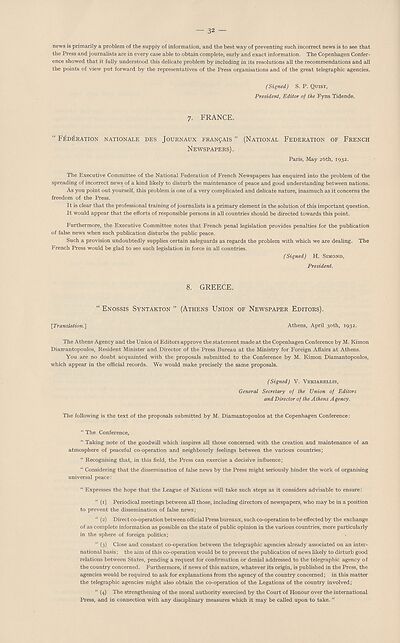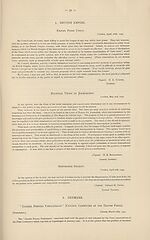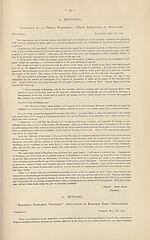Download files
Complete book:
Individual page:
Thumbnail gallery: Grid view | List view

— 32 —
news is primarily a problem of the supply of information, and the best way of preventing such incorrect news is to see that
the Press and journalists are in every case able to obtain complete, early and exact information. The Copenhagen Confer¬
ence showed that it fully understood this delicate problem by including in its resolutions all the recommendations and all
the points of view put forward by the representatives of the Press organisations and of the great telegraphic agencies.
(Signed) S. P. Quist,
President, Editor of the Fyns Tidende.
7. FRANCE.
" Federation
NATION ALE DES
JOURNAUX FRAN5AIS ”
Newspapers).
(National Federation of French
Paris, May 26th, 1932.
The Executive Committee of the National Federation of French Newspapers has enquired into the problem of the
spreading of incorrect news of a kind likely to disturb the maintenance of peace and good understanding between nations.
As you point out yourself, this problem is one of a very complicated and delicate nature, inasmuch as it concerns the
freedom of the Press.
It is clear that the professional training of journalists is a primary element in the solution of this important question.
It would appear that the efforts of responsible persons in all countries should be directed towards this point.
Furthermore, the Executive Committee notes that French penal legislation provides penalties for the publication
of false news when such publication disturbs the public peace.
Such a provision undoubtedly supplies certain safeguards as regards the problem with which we are dealing. The
French Press would be glad to see such legislation in force in all countries.
(Signed) H. Simond,
President.
8. GREECE.
" Enossis Syntakton ” (Athens Union of Newspaper Editors).
[Translation.] Athens, April 30th, 1932.
The Athens Agency and the Union of Editors approve the statement made at the Copenhagen Conference by M. Kimon
Diamantopoulos, Resident Minister and Director of the Press Bureau at the Ministry for Foreign Affairs at Athens.
You are no doubt acquainted with the proposals submitted to the Conference by M. Kimon Diamantopoulos,
which appear in the official records. We would make precisely the same proposals.
(Signed) V. Vekiarellis,
General Secretary of the Union of Editors
and Director of the Athens A gency.
The following is the text of the proposals submitted by M. Diamantopoulos at the Copenhagen Conference:
“ The Conference,
“ Taking note of the goodwill which inspires all those concerned with the creation and maintenance of an
atmosphere of peaceful co-operation and neighbourly feelings between the various countries;
“ Recognising that, in this field, the Press can exercise a decisive influence;
“ Considering that the dissemination of false news by the Press might seriously hinder the work of organising
universal peace:
“ Expresses the hope that the League of Nations will take such steps as it considers advisable to ensure:
“ (1) Periodical meetings between all those, including directors of newspapers, who may be in a position
to prevent the dissemination of false news;
“ (2) Direct co-operation between official Press bureaux, such co-operation to be effected by the exchange
of as complete information as possible on the state of public opinion in the various countries, more particularly
in the sphere of foreign politics;
“ (3) Close and constant co-operation between the telegraphic agencies already associated on an inter¬
national basis; the aim of this co-operation would be to prevent the publication of news likely to disturb good
relations between States, pending a request for confirmation or denial addressed to the telegraphic agency of
the country concerned. Furthermore, if news of this nature, whatever its origin, is published in the Press, the
agencies would be required to ask for explanations from the agency of the country concerned; in this matter
the telegraphic agencies might also obtain the co-operation of the Legations of the country involved;
“ (4) The strengthening of the moral authority exercised by the Court of Honour over the international
Press, and in connection with any disciplinary measures which it may be called upon to take. ”
news is primarily a problem of the supply of information, and the best way of preventing such incorrect news is to see that
the Press and journalists are in every case able to obtain complete, early and exact information. The Copenhagen Confer¬
ence showed that it fully understood this delicate problem by including in its resolutions all the recommendations and all
the points of view put forward by the representatives of the Press organisations and of the great telegraphic agencies.
(Signed) S. P. Quist,
President, Editor of the Fyns Tidende.
7. FRANCE.
" Federation
NATION ALE DES
JOURNAUX FRAN5AIS ”
Newspapers).
(National Federation of French
Paris, May 26th, 1932.
The Executive Committee of the National Federation of French Newspapers has enquired into the problem of the
spreading of incorrect news of a kind likely to disturb the maintenance of peace and good understanding between nations.
As you point out yourself, this problem is one of a very complicated and delicate nature, inasmuch as it concerns the
freedom of the Press.
It is clear that the professional training of journalists is a primary element in the solution of this important question.
It would appear that the efforts of responsible persons in all countries should be directed towards this point.
Furthermore, the Executive Committee notes that French penal legislation provides penalties for the publication
of false news when such publication disturbs the public peace.
Such a provision undoubtedly supplies certain safeguards as regards the problem with which we are dealing. The
French Press would be glad to see such legislation in force in all countries.
(Signed) H. Simond,
President.
8. GREECE.
" Enossis Syntakton ” (Athens Union of Newspaper Editors).
[Translation.] Athens, April 30th, 1932.
The Athens Agency and the Union of Editors approve the statement made at the Copenhagen Conference by M. Kimon
Diamantopoulos, Resident Minister and Director of the Press Bureau at the Ministry for Foreign Affairs at Athens.
You are no doubt acquainted with the proposals submitted to the Conference by M. Kimon Diamantopoulos,
which appear in the official records. We would make precisely the same proposals.
(Signed) V. Vekiarellis,
General Secretary of the Union of Editors
and Director of the Athens A gency.
The following is the text of the proposals submitted by M. Diamantopoulos at the Copenhagen Conference:
“ The Conference,
“ Taking note of the goodwill which inspires all those concerned with the creation and maintenance of an
atmosphere of peaceful co-operation and neighbourly feelings between the various countries;
“ Recognising that, in this field, the Press can exercise a decisive influence;
“ Considering that the dissemination of false news by the Press might seriously hinder the work of organising
universal peace:
“ Expresses the hope that the League of Nations will take such steps as it considers advisable to ensure:
“ (1) Periodical meetings between all those, including directors of newspapers, who may be in a position
to prevent the dissemination of false news;
“ (2) Direct co-operation between official Press bureaux, such co-operation to be effected by the exchange
of as complete information as possible on the state of public opinion in the various countries, more particularly
in the sphere of foreign politics;
“ (3) Close and constant co-operation between the telegraphic agencies already associated on an inter¬
national basis; the aim of this co-operation would be to prevent the publication of news likely to disturb good
relations between States, pending a request for confirmation or denial addressed to the telegraphic agency of
the country concerned. Furthermore, if news of this nature, whatever its origin, is published in the Press, the
agencies would be required to ask for explanations from the agency of the country concerned; in this matter
the telegraphic agencies might also obtain the co-operation of the Legations of the country involved;
“ (4) The strengthening of the moral authority exercised by the Court of Honour over the international
Press, and in connection with any disciplinary measures which it may be called upon to take. ”
Set display mode to:
![]() Universal Viewer |
Universal Viewer | ![]() Mirador |
Large image | Transcription
Mirador |
Large image | Transcription
Images and transcriptions on this page, including medium image downloads, may be used under the Creative Commons Attribution 4.0 International Licence unless otherwise stated. ![]()
| League of Nations > Armament > Co-operation of the press in the organisation of peace > (32) |
|---|
| Permanent URL | https://digital.nls.uk/195356647 |
|---|
| Shelfmark | LN.IX |
|---|
| Description | Over 1,200 documents from the non-political organs of the League of Nations that dealt with health, disarmament, economic and financial matters for the duration of the League (1919-1945). Also online are statistical bulletins, essential facts, and an overview of the League by the first Secretary General, Sir Eric Drummond. These items are part of the Official Publications collection at the National Library of Scotland. |
|---|---|
| Additional NLS resources: |
|

